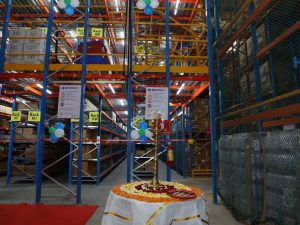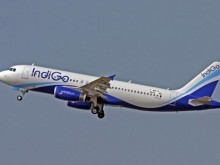“India has recognised the importance of expanding its domestic air cargo ecosystem beyond just the metro cities and that is where Tier 2 and Tier 3 cities are starting to play a much bigger role,” Amit Tandon, MD, Asia Shipping India. He added, “One of the most impactful initiatives has been the UDAN scheme, which focuses on improving regional air connectivity. Under this, many smaller airports have been upgraded to handle not just passenger traffic but also cargo—especially for sectors like agriculture, pharma and e-commerce that need faster, more efficient logistics. More airports are being developed under this scheme as greenfield projects. A strong momentum is also seen through PMGS and NLP initiatives, both of which prioritise developing multimodal logistics infrastructure in non-metro regions. These efforts are aimed at linking regional production hubs, like textile clusters, industrial parks and agri zones, to national and international markets via air. The increasing connectivity of the moffusil airports to the gateway airports also improves the efficiency of the export activity for the perishable products. What is promising is the growing investment in infrastructure like modern and well-equipped warehouses, temperature-controlled storage, digital cargo tracking, and bonded warehousing, at regional airports. Private players are also stepping in, which is helping to accelerate the process. Furthermore, cities like Indore, Lucknow, Coimbatore, and Guwahati and other export centres are already emerging as cargo nodes, and this trend is only going to strengthen with the passage of time. It’s a big step forward for inclusive trade growth and building a truly nationwide logistics network.”
Read More »Blue Dart Express Limited Clocks ₹ 5,720 Cr revenue for FY25, maintains Q4 Momentum
Blue Dart Express announced its financial results for the quarter and year ended March 31, 2025, following the conclusion of its Board Meeting which was held in Mumbai. In a fiscal year which was shaped by geopolitical uncertainty, macroeconomic volatility, and sectoral challenges, the company delivered a stable performance, underscoring its operational resilience and ability to maintain service continuity across markets. For the fiscal year ended March 31, 2025, Blue Dart reported revenue from operations of ₹ 5,720 crore and profit after tax of ₹ 245 crore. For the quarter ended March 31, 2025 (Q4 FY25), revenue from operations stood at ₹ 1,417 crore. Profit after tax for the quarter stood at ₹ 53 crore. Commenting on the announcement, Balfour Manuel, Managing Director, Blue Dart Express, said, “Our focus in FY25 was on delivering consistency, maintaining service quality, and enhancing our offering strength with significant investments towards our aviation capabilities and infrastructure, an approach that will continue as we gear up for the future. With a long-term perspective on these investments, we remain committed to reinforcing our core, adopting technology for efficiency, and delivering reliable service. Several of these investments are front-loaded, and we anticipate upcoming business growth to drive cost optimization. As we look ahead to FY26, we remain cautiously optimistic amid ongoing external uncertainties. Nonetheless, Blue Dart will continue to invest in expanding our network, advancing digital capabilities, and embedding sustainable practices to drive long-term operational strength to enhance service capabilities, deepen customer trust, and build operational resilience.” In the fiscal year gone by, Blue Dart was recognized for excellence across key areas including customer service, sustainability, compliance, and brand loyalty. The company continued to be recognized as …
Read More »Jeena expands Bhiwandi storage facility to boost efficiency
Jeena and Company has expanded its storage infrastructure at Bhiwandi, Mumbai facility. The Bhiwandi warehouse, which spans over 1.10 Lakh square feet, has a clear centre height of 50 feet and 30 feet shoulder height, providing a high-volume, scalable logistics environment. The facility design includes G+7 and G+6 heavy-duty pallet racking system, G+7 multi-tier shelving system. The warehouse also offers 2 forklifts, 2 stackers, and 14 hand pallet trollies. Its flexible design aims to allow optimised storage space thereby, empowering sellers to boost their business. This capacity expansion includes a 20% increase in storage capacity, adding over 1000 additional pallet positions through heavy duty racking. Additional 16,000 new location bins have been added to manage high volume freight and expand storage capabilities. Jeena’s Bhiwandi facility features a spiral chute to handle gravity-fed material for swift movement of smaller consignments from upper floors to the ground, cancelling operative disruptions between the packaging and dispatch process. Speaking on the development Prediman Koul, Chief Executive Officer, Jeena & Companysaid, “Evolution is an essential to our business. This capacity expansion at our Bhiwandi facility is meant to further streamline operations and reduce turnaround time. We are conscious of keeping ahead of the times and upgrading ourselves as per customer requirements. Proactive investment in infrastructure and technology helps us to offer ease and convenience to our partners.” Jeena is a leading third-party, end-to-end logistics service provider offering tech-enabled inventory management, pick, pack and all value adds, management of e-commerce operations and box in box out. The company also offers ambient temperature control and bonded FTWZ facilities (Free Trade Warehousing Zone).
Read More »CJ Logistics increases stake in CJ Darcl to 56%
In a move that reaffirms its deep-rooted partnership and commitment to India’s logistics sector, CJ Logistics Corporation, South Korea’s largest logistics company, has further infused USD 32 million as a combination of Primary and Secondary transaction into CJ Darcl Logistics Ltd. (CJ Darcl), one of India’s leading integrated logistics service providers, increasing its equity stake from 50% to 56%. The investment is aimed at strengthening CJ Darcl’s capital base and powering its next phase of growth. The funds will be strategically directed to accelerate its nationwide expansion across multimodal logistics infrastructure—spanning terminals, advanced warehousing, digital supply chain solutions, and alternative fuel platforms. CJ Logistics and CJ Darcl forged their partnership in 2017 through a strategic partnership, when the KOSPI listed Korean logistics giant acquired 50% stake in DARCL Logistics Ltd., later rebranded as CJ Darcl Logistics Ltd. The remaining 44% stakecontinues to be held by the founding Darcl Promoters and affiliates, reflecting continued alignment and stability in ownership. Mr. K.K. Agarwal, Chairman and Managing Director, CJ Darcl Logistics Ltd., commented, “This investment underscores CJ Logistics Corporation’s strong belief in our vision and performance. It is a testament to the trust we have built over the years and to our shared mission of transforming India’s logistics landscape. The capital will enable us to scale our integrated offerings, invest in next-generation technologies, and drive sustainable growth. We are creating a future-ready logistics enterprise that blends Indian depth with global excellence.”
Read More »KSH Distriparks to expand capacity with new yard in Talegaon
The year 2025 has seen growth to begin with. For 2024 -2025 financial year we ended with 100000 TEU’s and are expecting significant growth in 25-26. We are currently expanding capacity,” says Malcolm Dsouza, CEO, KSH Distriparks, adding, “Adding additional capacity with a new yard in Talegaon. Expected launch in Nov 2025. We are increasing our existing fleet size by an additional 20 per cent of our own and 40 per cent increase in the vendor’s fleet.”
Read More »IndiGo to start flights from Mumbai to Amsterdam & Manchester in July
IndiGo is all set to launch its maiden service from Mumbai to Amsterdam and Manchester from July 2025. The airline will operate a wet leased Boeing 787 on the routes which can carry up to 18-20 tonnes of cargo in each direction. “The opportunity for cargo for us is significant. It nicely coincides with the Make in India campaign which is becoming more and more prominent in terms of India becoming the global production hub,” Pieter Elbers, CEO, IndiGo said.
Read More »‘Alliances with other countries are crucial to boost supply chain resilience and efficiency’
Rajen Bhatia, MD, Tulsidas Khimji said, “The landscape of global trade is undergoing significant transformation, driven by strategic alliances, redefined trade routes, and technological advancements. These developments are enhancing connectivity and efficiency across supply chains. As India is now connected to the global world in good times, alliances with countries is important and even more when Geo-political and Geo-economical issues are going on the alliances with regards to supply chain as all of us are dependent on other countries for some materials whatever we manufacture. India’s integration into global supply chains has become increasingly vital amid ongoing geopolitical and geoeconomics shifts. As nations reassess dependencies and seek more resilient trade networks, India is emerging as a strategic partner in the evolving global landscape.”Collaborations among major shipping lines, such as the Ocean Alliance (CMA CGM, Evergreen, Cosco, and OOCL), enable carriers to share resources and coordinate services. Deploying larger vessels reduces per-unit shipping costs. Access to a broader range of services and destinations without individual investments in new routes. Improved Service Frequency: Increased sailing frequencies enhance reliability for businesses operating in just-in-time supply chains. • Risk Mitigation: Sharing risks associated with market volatility and large-scale investments contributes to industry stability. Digital Platforms: Regional Single Window (RSW) systems, like the ASEAN Single Window, facilitate interoperability among National Single Windows (NSWs), streamlining cross-border trade and reducing barriers within regions. Redefined Trade Routes India–Middle East–Europe Economic Corridor (IMEC): Launched in 2023, IMEC aims to bolster economic development by fostering connectivity between Asia, the Persian Gulf, and Europe. The corridor is a proposed route from India to Europe through the United Arab Emirates, Saudi Arabia, Israel, and Italy (or Greece). Belt and Road Initiative (BRI): …
Read More »‘Govt duly recognises India’s strategic position and potential’
Keku Bomi Gazder, CEO and MD, Aviapro Logistic said, “India plays a crucial role in the global air cargo ecosystem. The country’s geographical position offers a natural advantage, placing it at the center of the East and West, and allowing seamless connectivity to Asia, the European Union, North America, and the Middle East. Airports in Delhi, Mumbai, Bengaluru, and Hyderabad serve as key transshipment hubs, enabling smooth and efficient cargo flow. With the emergence of India as a key exporter in sectors like pharmaceuticals, electronics, textiles, and automotive, the country is steadily moving towards claiming its place as a global manufacturing hub – the demand for air freight comes in here. The government duly recognizes India’s strategic position and potential and is accordingly aligning initiatives to assist the expansion of India’s air cargo footprint into emerging markets such as Africa, Central Asia, and Latin America. Initiatives such as Gati Shakti and the Open Sky policy promote bilateral and free trade agreements to enhance India’s air freight links with partner countries. Also, dedicated cargo corridors are positioning India as a reliable cargo point.”
Read More »‘Trade alliance, collaborations crucial to deal with supply chain crisis’
Dr. Surendra K Ahirwar, ED, Traffic Commercial (Rates) and Business Development, Ministry of Railways said, “At present, in India, both geopolitical crises and geo-economic crises going on together. It is posing huge challenge to global supply chain. It is also increasing the intensity of complexity and uncertainty of global supply chains. Great alliances, ties, relationships with other countries is the solution for this. In such a situation we can rely on those we share great trade relations with to improve resilience. Importance of alliances is crucial during crises.”
Read More »‘Cost of doing business essential to improve ease of doing business’
Jivisha Joshi, Deputy Secretary, DPIIT, Ministry of Commerce and Industry said, “With the ease of doing business, it is very important to understand the cost of doing business. EoDB comes from the costs that it involves. For example, it has become important to understand and adopt sustainable business practices, green logistics, industry understands it, but there’s a cost involved. It should be feasible for all. So, if we talk about changing regulatory policies, we must understand the impact it will have on the businesses. Everything involves costs that should be considered too.”
Read More » Cargo Breaking News
Cargo Breaking News









